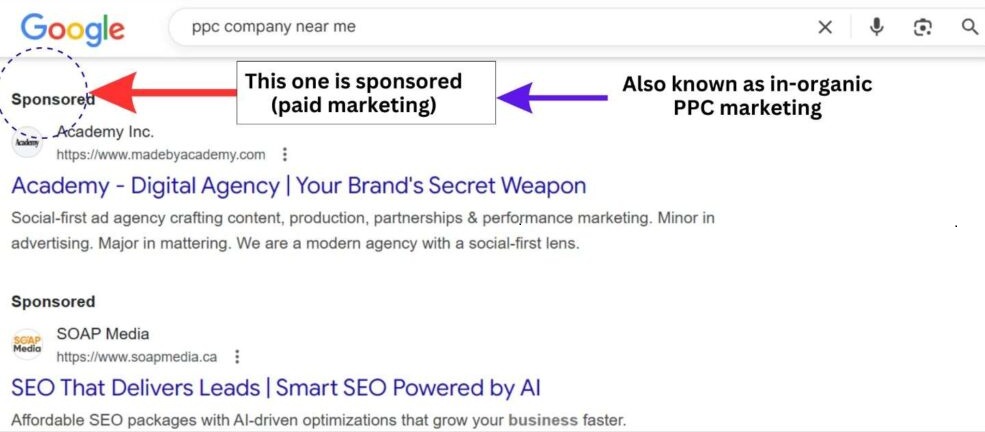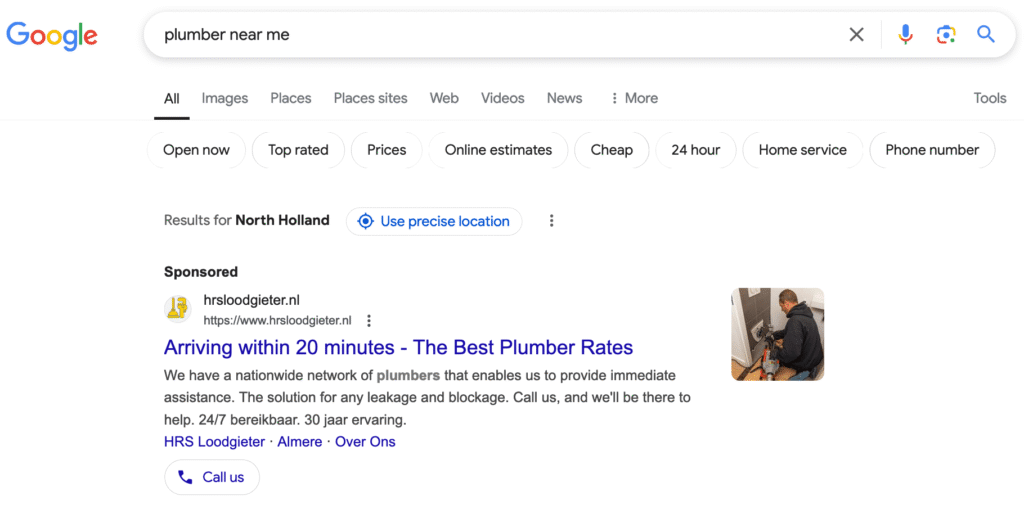Ever wondered what does sponsored mean on Google? When you see the word “sponsored” or “ad” in search results, it simply means the link is paid for by a business. These sponsored results appear above organic listings, giving companies more visibility. In this guide, you’ll learn what sponsored means, how Google ads work, whether they’re safe, and how to recognize them while searching online.
Key Points About Sponsored Results
Understanding what does sponsored mean on Google becomes easier when you look at the main features of these results. Sponsored links may look like regular search results, but they have important differences.
- Paid Placement – Advertisers pay Google to display their websites when people search for specific keywords.
- Higher Visibility – Sponsored results often appear at the very top, attracting more clicks than organic listings.
- Auction System – Businesses bid for keywords, and higher bids usually earn better ad positions.
- Not Always Risk-Free – While many ads are from trusted brands, some can lead to scams or fake services.
- Clear Labels – Sponsored results carry a small “Ad” or “Sponsored” label that helps users tell them apart from organic results.
These key points show why it’s important to know the difference between organic search results and paid ads.
How Sponsored Results Work on Google

To understand what does sponsored mean on Google, it helps to know how these results actually work. Sponsored results are not random. Instead, they appear through a system that connects advertisers with people searching for specific terms.
At the core of this system is Google Ads, where businesses choose the keywords they want to target. When someone searches using those keywords, Google runs an auction. Advertisers compete by bidding on those terms. The higher the bid, and the more relevant the ad, the better the chance it shows up at the top of search results.
Sponsored results also use a pay-per-click (PPC) model. This means advertisers only pay when someone actually clicks their ad. For businesses, it’s a cost-effective way to reach people already looking for their products or services. For Google, it generates billions in revenue every year.
However, money alone doesn’t decide placement. Google also considers ad quality and relevance. If two companies bid the same amount, the ad that is more relevant and useful to the searcher often wins a higher position. This helps ensure that users still see results that match their intent, not just ads from the highest bidder.
In short, sponsored results work by combining bids, ad quality, and search relevance. This balance allows businesses to promote their services, while users still find useful results at the top of the page. Companies that want to compete better often seek expert help, such as professional SEO services in the Philippines, to improve visibility and ad performance.
Why Google Uses Sponsored Results

When people ask what does sponsored mean on Google, the next question is often why Google relies so heavily on these paid results. The answer is simple: sponsored results are a major part of Google’s business model and provide value to both companies and users.
First, sponsored ads are how Google makes most of its revenue. Businesses around the world pay to appear at the top of search results because those positions attract the most clicks. This system allows Google to offer its search engine for free while funding continuous updates, security improvements, and better user experiences.
Second, sponsored results help businesses reach the right audience faster. If someone searches for “best running shoes,” a brand can appear immediately with a tailored ad that matches what the user wants. This creates a direct link between consumer intent and business offerings.
Third, sponsored results provide users with relevant options. Google’s system is designed to match ads with what people are actively searching for. Even though these results are paid, they often highlight useful products, services, or solutions that users may find helpful.
Finally, companies that want to maximize their performance often combine paid ads with expert strategies, such as outsourcing SEO in the Philippines. By doing so, they strengthen both paid and organic visibility, ensuring long-term success in highly competitive industries.
In short, Google uses sponsored results because they benefit everyone involved: Google sustains its free platform, businesses gain visibility, and users get faster access to what they are searching for.
Are Sponsored Results Safe?
Many people who wonder what does sponsored mean on Google also ask if these results are safe to click. The short answer is yes — most sponsored ads are from trusted companies. However, like any online space, there are risks if you’re not careful.
Legitimate businesses use sponsored results to reach customers, but scammers sometimes exploit the system. Fake ads may appear convincing yet lead to harmful websites. These can trick users into giving personal information, downloading malware, or paying for services that don’t exist.
How to Protect Yourself
To stay safe when clicking sponsored results, follow these simple steps:
- Look for official domains – Always check the website address. Government or financial services should end with trusted extensions like or .
- Watch for misleading URLs – Be cautious if the link looks unusual or redirects you to another site.
- Slow down before clicking – Don’t just click the first result. Take a moment to review the link and preview the page.
- Check the “Ad” or “Sponsored” label – Remember, if it’s marked as an ad, the placement is paid for, not earned organically.
Businesses that want to appear in safe, trustworthy ways often work with professional Digital Marketing Services to build both ad campaigns and organic presence. For smaller businesses and startups, affordable SEO Philippines options make it possible to improve online visibility without overspending, while keeping marketing ethical and secure.
How to Identify Sponsored Links on Google
If you’re still asking what does sponsored mean on Google, one of the most important things to know is how to spot these ads quickly. Sponsored links often look similar to organic results, but a few key signs can help you tell the difference.
Look for Labels
Google marks paid ads with a small “Ad” or “Sponsored” label. This label may appear before the link or above the description. It’s designed to show users that the result is a paid placement.
Check the Position
Sponsored results usually appear at the very top of the search results page. Sometimes, they also appear at the bottom. If a result looks like an ad and is above the first organic link, it’s likely sponsored.
Examine the URL
Carefully check the website address. Scammers may use addresses that look close to real ones but are slightly altered. If something feels off, it’s safer not to click.
Compare to Organic Results
Organic results are ranked based on relevance and quality, while sponsored results are paid placements. Understanding this difference helps you decide which link better fits your needs.
For businesses, showing up in these spots requires smart ad campaigns like pay per click advertising in the Philippines. Pairing ads with expert guidance from an SEO specialist in the Philippines helps improve both paid and organic visibility. Companies looking for long-term growth also consider when to buy SEO services to secure stronger positions in organic rankings.
Key Takeaway: Understanding What Does Sponsored Mean on Google
By now, you know the answer to what does sponsored mean on Google and why it matters. Sponsored results are simply paid ads that businesses use to gain visibility at the top of search results. While most are safe and useful, some may pose risks if users aren’t careful.
The key is awareness. Sponsored links are clearly labeled, and learning to spot those labels helps you browse more confidently. For businesses, sponsored results offer a fast way to reach customers, especially when paired with strong SEO strategies that build long-term organic visibility.
In the end, knowing how sponsored results work gives you more control. You’ll make smarter choices online, whether you’re searching for services, comparing brands, or deciding which link to trust.
FAQs
1. What does sponsored mean on Google?
“Sponsored” on Google means the link is a paid advertisement. Businesses pay Google to display their websites for specific keywords. These ads appear above or below organic results.
2. Are sponsored results the same as organic results?
No, they are different. Sponsored results are paid placements, while organic results are ranked naturally based on relevance and SEO. Both appear on the same search page but are labeled differently.
3. Are sponsored results safe to click?
Most sponsored ads are safe and from legitimate companies. However, some can be misleading or link to scam websites. Always check the domain before clicking.
4. How can I tell if a link is sponsored?
Sponsored links have a small “Ad” or “Sponsored” label next to them. They often appear at the very top of search results. These markers help distinguish them from organic listings.
5. Why does Google use sponsored results?
Google uses sponsored results to generate revenue. Businesses pay for visibility, and Google uses that income to keep search free and improve its platform. This benefits both Google and advertisers.
6. How does Google decide which sponsored ad appears first?
Google runs an auction each time someone searches. Advertisers bid on keywords, but ad quality and relevance also affect placement. It’s not always the highest bidder who wins.
7. Do companies pay for every sponsored click?
Yes, Google uses a pay-per-click (PPC) model. Advertisers only pay when someone clicks their ad. This makes ads cost-effective and measurable.
8. Can scams appear in sponsored results?
Yes, though less common, scams can slip into ads. They may mimic official sites or use misleading URLs. That’s why reviewing the link is so important.
9. How can I protect myself when using sponsored results?
Check the website address carefully before entering personal details. Look for trusted domains like .gov or .org when dealing with official services. Take a moment before clicking to confirm the site looks legitimate.
10. Should businesses rely only on sponsored results?
No, relying only on ads can be expensive long-term. Businesses should combine ads with SEO to build organic visibility. This balance creates stronger results and trust with customers.